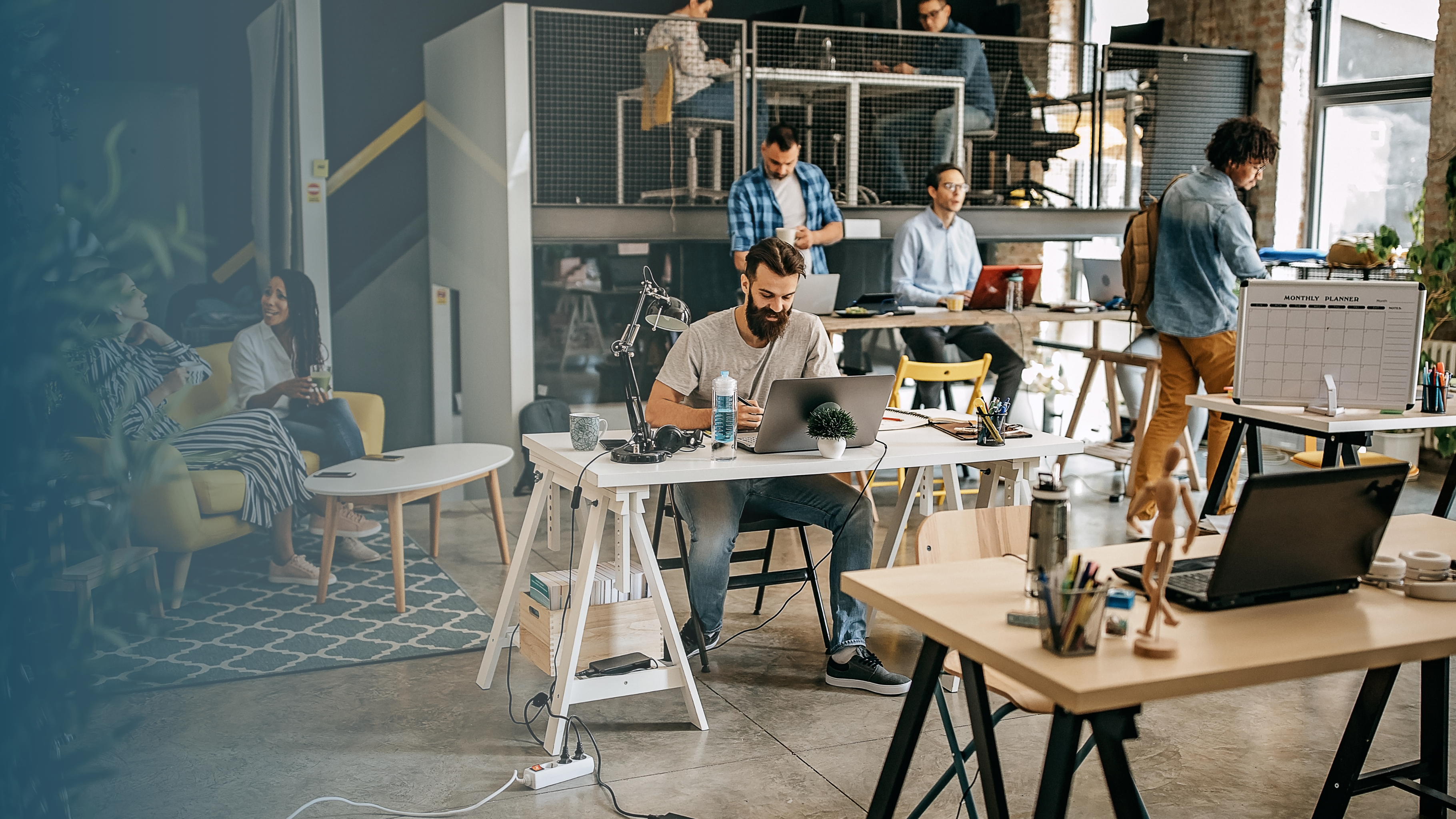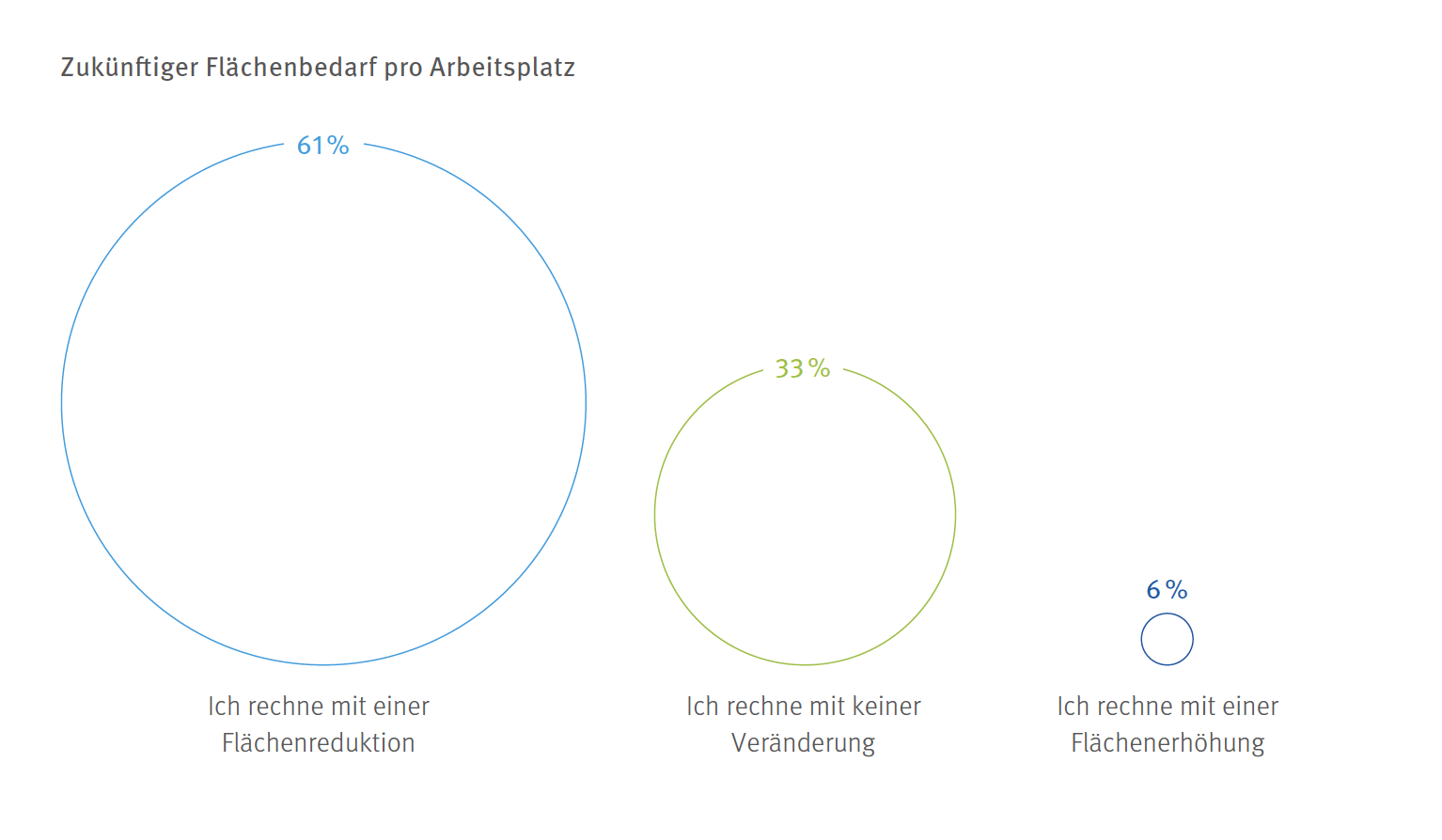
Demand for office space is falling
German companies are already signaling a sharp drop in demand for office space. Deutsche Bank has announced that it will reduce its office space by 40%, Deutsche Telekom by as much as 50%. These figures corroborate the results of an ifo survey, which show that the proportion of unused workstations in offices has tripled since 2019. One in eight desks in German offices is unused. "Currently, 12.3% of all on-site workstations are underutilized on an average day due to home office. Before Corona in 2019, it was only 4.6%," says ifo expert Simon Krause. Especially in the sectors of information technology, advertising and market research, management consulting as well as the pharmaceutical industry, offices are increasingly left unoccupied.

A quarter of employees work from home several times a week, resulting in unused workstations in the office.
Multifunctional Spaces
Hybrid models are shaping the future of the working world and at the same time transforming the demand for office space. Flexible, multifunctional structures are required, and it is precisely for this purpose that vacant real estate must be converted and used. Cooperate Offices can bring together different combinations of people, companies and organizations. Space is divided up according to need, creating new synergies. As sensible and smart as this may sound, is this type of space utilization realistic and feasible?
Allianz Park in Stuttgart as an example
First of all, more consistent thought should be given to actual needs. This can mean questioning existing construction projects once again. A very exemplary example of this is the Allianz Park in Stuttgart-Vaihingen, the new headquarters of Allianz Lebensversicherungs-AG. A completely new location is being created here for 4,500 employees in an outlying district, which is fully adapted to the hybrid working mode and has been adapted to the premise that employees will continue to work mobile for around half of their working time. As a result, the site turns out to be smaller than originally planned. This has two advantages: the new building can be smaller than previously planned and perfectly tailored to hybrid working. The previous city center locations will be freed up for residential units. These are rare, especially in Stuttgart's cauldron, and thus much more valuable than desks, which then remain mostly unoccupied in case of doubt. But what to do with existing spaces where downsizing is not a sensible solution?

Also in the Drees & Sommer Workspace Benchmark Report 2022 61% of the 230 participants from various companies and around 20 different sectors expect a reduction in workspace.
Flexible and multifunctional concepts are in demand
In retail, pop-up stores are already converting vacant retail space. Due to booming e-commerce, flexible and short-term rentable space has emerged as the new retail strategy. Through digital platforms and tools, multifunctional real estate is also becoming an opportunity for more flexibility in other sectors. In Stuttgart, for example, the free portal roomstr free portal can be used to search for and advertise vacant commercial space. Offers of vacant properties and demand from entrepreneurs are matched and open up the possibility for flexible concepts such as coworking spaces and creative centers. The fact that the Institute for Retail Research (IFH) is also using the matching software "LeAn" as part of the project "City Labs for Germany - Vacancy and Settlement" is also a key factor. LeAn shows the urge for solutions. The software likewise matches vacant properties in German city centers.
Fractional Real Estate
While the concept of pop-ups is about improving the utilization of unused real estate, the trend of fractional real estate takes this idea to the next level. Fractional real estate is "fragmented commercial real estate" that commercializes one and the same space for different types of use. Along the lines of: office from Monday to Friday and art exhibition on the weekend. Or yoga studio during the day and club at night. Modular spaces and flexible furniture make it possible.
Innovation needs face-to-face exchange
Nevertheless, even in an increasingly digital world of work, the office is of central importance, but it needs to be transformed. Alain Thierstein, Professor of Spatial Development at the Technical University of Munich, was already convinced in 2020: "Exchange is important for innovation. And for that, you need interaction - face to face." Innovation and idea development are impossible, he said, if everyone sits at home in front of their own computers. From Thierstein's point of view, the vacancy rate of offices depends primarily on the quality of stay they offer .

Individual formats
And we are also convinced: Empty, open room concepts with row upon row of unused desks are no longer in keeping with the times. That's why it's worth analyzing: What do we really do in the office today and, above all, in the future (still or again)? The rooms must then be consistently adapted to these forms of use. Open-plan offices in particular are simply no longer the right format for the digitalized world of work, as it is not possible to work particularly well here, either in a concentrated manner for oneself or interactively with others. Flexible meeting rooms in different sizes as well as individual workspaces for quiet work and video conferencing are now the much better choice here. Hybrid work needs multifunctional spaces, and the same applies here as to the entire strategy for hybrid work: Solutions are becoming more individual and one-size-does-not-fit-all!
